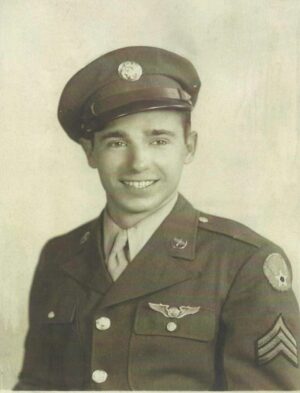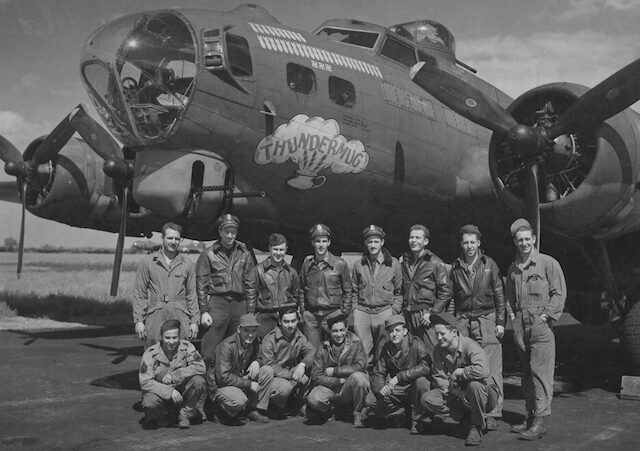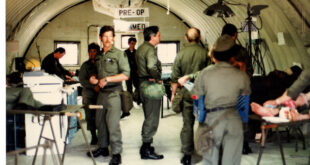Born a century ago in Chicago Heights, Ted Micci is a living testament to the determination of the crews who flew bombing missions over Europe during World War II.
Attilio (Ted) Micci was born 100 years ago in his parents’ home in Chicago Heights. Massimo and Frances Rotaloni Micci emigrated from Marche, Italy, and settled in the Hungry Hill Italian neighborhood of the city. Micci’s maternal grandparents lived across the street, and his aunts and uncles lived down the block. They all shared Sunday dinners together. Micci loved everything his mother prepared. “She was a good cook,” he says.
Micci graduated from Garfield Grade School and attended Bloom High School before transferring to Joliet Central High School when his family moved. After graduating, he worked as an apprentice electrician until joining the Army Air Forces in October 1942 with three buddies. “To get what we wanted, we volunteered,” he says. “I was interested in airplanes.”
Micci completed basic training and airplane mechanic school in Texas. While working on a cadet plane, the pilot asked Micci if he wanted a ride. Micci grabbed his parachute, harness and jacket, jumped in, and they took off. “He did everything he possibly could with that airplane. I almost got sick,” says Micci. “Oh man, especially when you first ride — it was an experience, and from then on, I loved it.”
 Micci worked as an airplane mechanic until he volunteered to become a radio operator. He received his training in Wisconsin and began flying with B-17 (Flying Fortress) bomber groups. Micci was assigned to a 10-man crew: four officers and six enlisted men. Based in Walla Walla, Washington, they trained daily, “in order to get yourself indoctrinated into the plane itself, get to know your crew people and get to know your job that you’re supposed to do on the plane,” Micci says.
Micci worked as an airplane mechanic until he volunteered to become a radio operator. He received his training in Wisconsin and began flying with B-17 (Flying Fortress) bomber groups. Micci was assigned to a 10-man crew: four officers and six enlisted men. Based in Walla Walla, Washington, they trained daily, “in order to get yourself indoctrinated into the plane itself, get to know your crew people and get to know your job that you’re supposed to do on the plane,” Micci says.
They picked up their B-17 at Fort Sheridan, Illinois, flew to Maine and then on to Scotland. Micci was assigned to the 364th Bomb Squadron of the 305th Bomb Group. Each bomb group consisted of four bomb squadrons, and every squadron had 21 B-17s.
Micci was stationed at the Chelveston air base in England with the Eighth Air Force and arrived shortly after a fateful August 1943 bombing run over Schweinfurt, Germany. “They lost 60 bombers with 10 men on each one,” says Micci. “We were replacements for those who didn’t come back.” When Micci arrived, the personal effects of those killed in action were being collected and removed from the barracks. “The feeling was not good,” he says.
The 305th Bomb Group did not have fighter escorts until their later missions. They flew in formation over Norway, Belgium, Holland and Germany, targeting such strategic areas as oil refineries, ball bearing factories, airplane manufacturing plants and mineral mines.
The men faced not only enemy gunfire, but also extreme below-zero temperatures. “You get frost on your oxygen tank, frost on your eyelids,” Micci says. They were shot at by anti-aircraft artillery on the ground and enemy fighter planes in the air. “There’s no foxholes up there!” says Micci. “You’re trying to save your fanny and shoot at them if possible. There’s nothing you can do when they shoot from the ground. You can’t evade them; you can’t dodge them.”
Micci and his crew had several close calls with their plane, Thundermug. On one bombing mission, the B-17 in front of them blew up after being hit by ground cannon fire. “No parachutes, no nothing from that plane!” Micci remembers. Debris from the explosion nearly hit the Thundermug. “We had to do some maneuvering,” he says. “I felt sorry for the guys there.”
Another close call occurred flying over Oslo, Norway. While his crew dropped bombs over the targeted mineral mine, the 70-below-zero temperature was causing the gas valve to freeze. The Thundermug left formation and flew low over the choppy ocean waves in the frigid November weather. “We threw all our guns out and everything to make our ship lighter because we weren’t getting any gas into our main tank,” says Micci. “We kept flying, kept flying, kept flying, and meanwhile I was sending out SOS messages on my radio.” The crew was ready to ditch the plane when they spotted English territory. They barely made it and landed at the very end of a runway. “All four engines stopped: no gas! That was it!” Micci says. “I got out and kissed the ground.”
Planes were lost on every mission. The Thundermug was riddled with holes, but it was always able to stay in the air and did not lose any men. “We lucked out,” Micci says.
During battles, Micci manned a gun and assisted the crew. “You’re more or less a runner between all the gunners, take their place because they got hurt or they’re frozen, because we’re 50 below zero up there,” he says. “Maybe their ammo is low and you help replenish it. There’s always something to do to help out.”
Every mission began the same. The men awoke at 2 a.m., ate breakfast, were briefed, grabbed their gear, boarded the plane and were ready for takeoff at 6 a.m. They were debriefed upon their return. “They’d want to know how many fighters, how many this and how many that,” Micci says. “You just go up and do your work and that’s it, and take it as it comes when the fighters come at you or they shoot cannons up at you.”
Micci completed his last mission on March 22, 1944, over Berlin. “I flew 25 missions; that was the max at the time,” he says. He returned to the States in April, became a radio instructor at Lowry Field in Denver and married Esther Buccarelli in December 1944 while on leave. Micci was discharged in October 1945 with the rank of Tech Sergeant. Among his decorations are a Distinguished Flying Cross and an Air Medal with three Oak Leaf Clusters. Micci is featured in the American Air Museum in Britain and is a member of the Joliet Stone City Veterans of Foreign Wars Post 2199.
A retired electrician, Micci has four children, eight grandchildren and five great-grandchildren. His interest in planes continues, and through the years, he has ridden in B-17s during military airplane tours. At the time of this interview, he was looking forward to his eighth ride in a bomber as a civilian.
Micci’s late wife is buried at Abraham Lincoln Cemetery, which he visits regularly. The proposed NorthPoint Compass Project is troubling to him, as the trucking depot would greatly impact the serene environment of the cemetery by bringing an additional 5,000 semi trucks per day into proximity with the hallowed grounds. Micci is among many veterans and others who are plaintiffs in a legal battle against the project.
Reflecting on his time in the Air Force, Micci says, “It was a surprising adventure. You’re getting into situations where you have to think for yourself and try to survive for yourself … you do a lot of praying.”
The above appears in the October 2021 issue of the print version of Fra Noi. Our gorgeous, monthly magazine contains a veritable feast of news and views, profiles and features, entertainment and culture. To subscribe, click here.
 Fra Noi Embrace Your Inner Italian
Fra Noi Embrace Your Inner Italian







